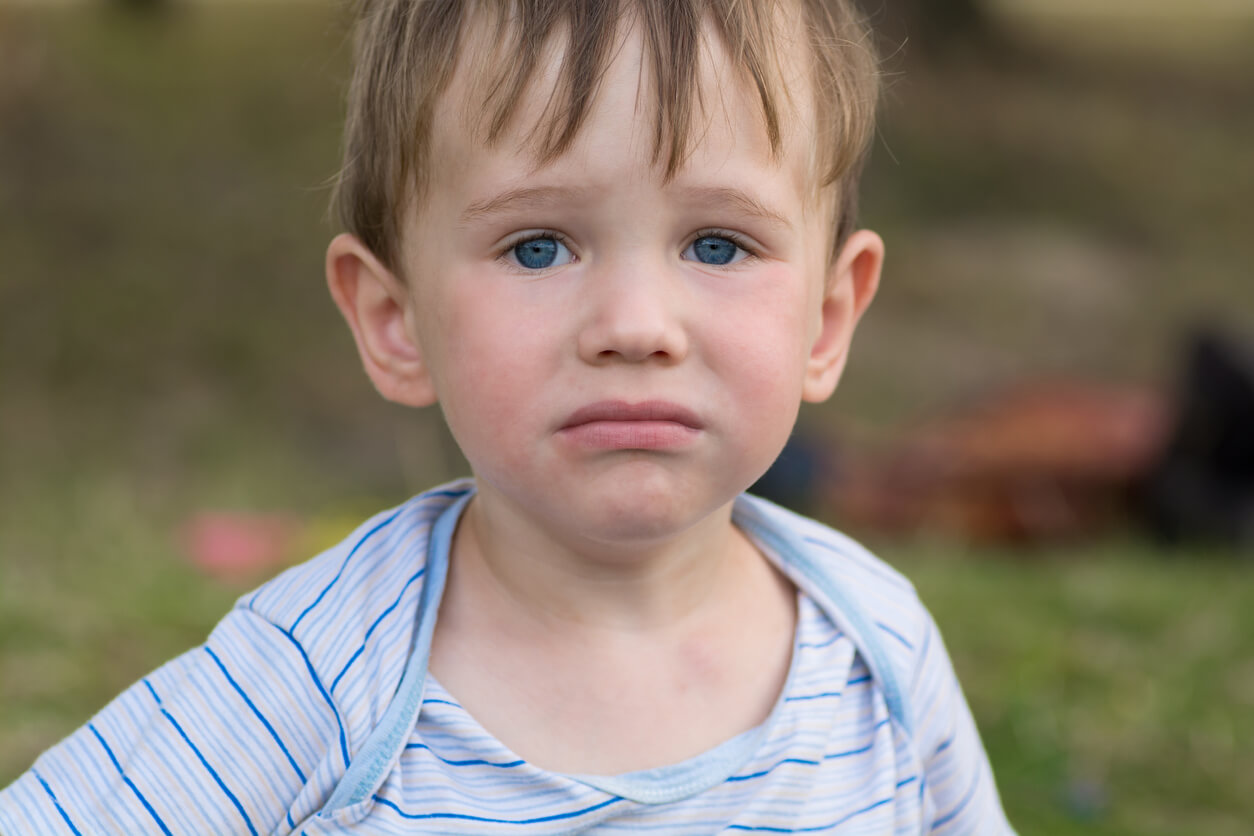My Child Never Cries: Why?


Written and verified by the psychologist Mara Amor López
You may be worried because you notice that your child never cries, despite having reason to do so. This may be because they repress their tears or because there really is some physiological problem that makes it difficult for them to do so. First of all, you must know what the real cause is in order to find a solution.
When children are small, we allow them to cry, but once they’re seven or eight years old, we tend to tell them that they’re too old to cry. It’s even worse when, because of society’s prejudices, we tell boys they’re girls or sissies or tell them that boys don’t cry. Even so, we mustn’t forget that we all have the right to cry, whatever age or gender we are. Children of these ages also face difficulties and problems that make them feel sad and need to express it through tears.
It’s not beneficial to encourage children to hold back tears
It’s not good for us to encourage children to hold back their tears, as they’re the way to express certain emotions. Pain that’s not expressed with any emotion, especially in childhood, stays inside and hurts. That’s why it’s so important to let them express their emotions. Just as they laugh when they’re happy, they also have the right to cry when they feel sad or distressed.
What’s more, imagine how complicated it can be for your child to never cry. How do you know when they need our caresses, affection, and comfort? The question isn’t that we want them to be very sensitive or cry. Rather, it’s about helping them express their emotions.

What can you do if your child never cries?
As we’ve said, repressing tears isn’t healthy and can have consequences for the emotional development of children and adolescents. For this reason, you should consider the following:
- Observe your attitude with them, improve communication, and be more understanding and affectionate. You should always offer them your unconditional love and support.
- Consider whether your child has excessive control over their emotions. This rigidity leads to great fragility and tension in the child.
- Notice if you’ve ever made them feel ashamed for crying. If so, your child may think that this emotional expression will embarrass you or simply that it won’t resonate with you.
- Make them feel that you care about their moods, emotions, and good and bad days. Also, let them know that you allow them to express how they feel in whatever way they need to. You won’t be able to comfort a child if they keep their grief to themself, so you need to be more responsive.
My child never cries as a consequence of a rare disease
On the other hand, there’s a rare disease that prevents children from crying. According to studies carried out by American researchers, the cells of children with NGLY1 deficiency don’t have enough aquaporin proteins and this doesn’t allow them to produce tears.
This discovery, made by scientists at the Sanford Burnham Prebys Medical Discovery Institute, may explain some of the symptoms of this rare disease:
- Inability to produce tears
- Developmental delays
- Multifocal epilepsy
- Abnormal liver function
- Seizures

A disease that has no cure
There are approximately 60 people in the world who don’t cry. Moreover, for now, there’s no cure for this disease and treatments are focused on treating some of the symptoms that this disorder produces. However, thanks to this discovery, steps forward can be made to locate some drugs that help increase aquaporins.
About why my child never cries
If your child never cries and you don’t understand why and what you should do, we hope this article has been helpful. A child may not cry because they have a physiological problem that makes it impossible for them to cry. Also, in many cases, children repress tears because, at some point, you or someone else has made them feel ashamed or has scolded them for crying.
It’s important to keep in mind that we shouldn’t tell children not to cry. They should cry if they need to, because it’s part of the expression of emotions, just like laughter, and they shouldn’t be shamed for it. We must normalize that both boys and girls can cry if they feel like it in order to have good emotional development.
You may be worried because you notice that your child never cries, despite having reason to do so. This may be because they repress their tears or because there really is some physiological problem that makes it difficult for them to do so. First of all, you must know what the real cause is in order to find a solution.
When children are small, we allow them to cry, but once they’re seven or eight years old, we tend to tell them that they’re too old to cry. It’s even worse when, because of society’s prejudices, we tell boys they’re girls or sissies or tell them that boys don’t cry. Even so, we mustn’t forget that we all have the right to cry, whatever age or gender we are. Children of these ages also face difficulties and problems that make them feel sad and need to express it through tears.
It’s not beneficial to encourage children to hold back tears
It’s not good for us to encourage children to hold back their tears, as they’re the way to express certain emotions. Pain that’s not expressed with any emotion, especially in childhood, stays inside and hurts. That’s why it’s so important to let them express their emotions. Just as they laugh when they’re happy, they also have the right to cry when they feel sad or distressed.
What’s more, imagine how complicated it can be for your child to never cry. How do you know when they need our caresses, affection, and comfort? The question isn’t that we want them to be very sensitive or cry. Rather, it’s about helping them express their emotions.

What can you do if your child never cries?
As we’ve said, repressing tears isn’t healthy and can have consequences for the emotional development of children and adolescents. For this reason, you should consider the following:
- Observe your attitude with them, improve communication, and be more understanding and affectionate. You should always offer them your unconditional love and support.
- Consider whether your child has excessive control over their emotions. This rigidity leads to great fragility and tension in the child.
- Notice if you’ve ever made them feel ashamed for crying. If so, your child may think that this emotional expression will embarrass you or simply that it won’t resonate with you.
- Make them feel that you care about their moods, emotions, and good and bad days. Also, let them know that you allow them to express how they feel in whatever way they need to. You won’t be able to comfort a child if they keep their grief to themself, so you need to be more responsive.
My child never cries as a consequence of a rare disease
On the other hand, there’s a rare disease that prevents children from crying. According to studies carried out by American researchers, the cells of children with NGLY1 deficiency don’t have enough aquaporin proteins and this doesn’t allow them to produce tears.
This discovery, made by scientists at the Sanford Burnham Prebys Medical Discovery Institute, may explain some of the symptoms of this rare disease:
- Inability to produce tears
- Developmental delays
- Multifocal epilepsy
- Abnormal liver function
- Seizures

A disease that has no cure
There are approximately 60 people in the world who don’t cry. Moreover, for now, there’s no cure for this disease and treatments are focused on treating some of the symptoms that this disorder produces. However, thanks to this discovery, steps forward can be made to locate some drugs that help increase aquaporins.
About why my child never cries
If your child never cries and you don’t understand why and what you should do, we hope this article has been helpful. A child may not cry because they have a physiological problem that makes it impossible for them to cry. Also, in many cases, children repress tears because, at some point, you or someone else has made them feel ashamed or has scolded them for crying.
It’s important to keep in mind that we shouldn’t tell children not to cry. They should cry if they need to, because it’s part of the expression of emotions, just like laughter, and they shouldn’t be shamed for it. We must normalize that both boys and girls can cry if they feel like it in order to have good emotional development.
All cited sources were thoroughly reviewed by our team to ensure their quality, reliability, currency, and validity. The bibliography of this article was considered reliable and of academic or scientific accuracy.
- Caglayan, A. O., Comu, S., Baranoski, J. F., Parman, Y., Kaymakçalan, H., Akgumus, G. T., … & Gunel, M. (2015). NGLY1 mutation causes neuromotor impairment, intellectual disability, and neuropathy. European journal of medical genetics, 58(1), 39-43. https://www.sciencedirect.com/science/article/abs/pii/S1769721214001682
-
Enns, G. M., Shashi, V., Bainbridge, M., Gambello, M. J., Zahir, F. R., Bast, T., … & Goldstein, D. B. (2014). Mutations in NGLY1 cause an inherited disorder of the endoplasmic reticulum–associated degradation pathway. Genetics in Medicine, 16(10), 751-758.
This text is provided for informational purposes only and does not replace consultation with a professional. If in doubt, consult your specialist.








